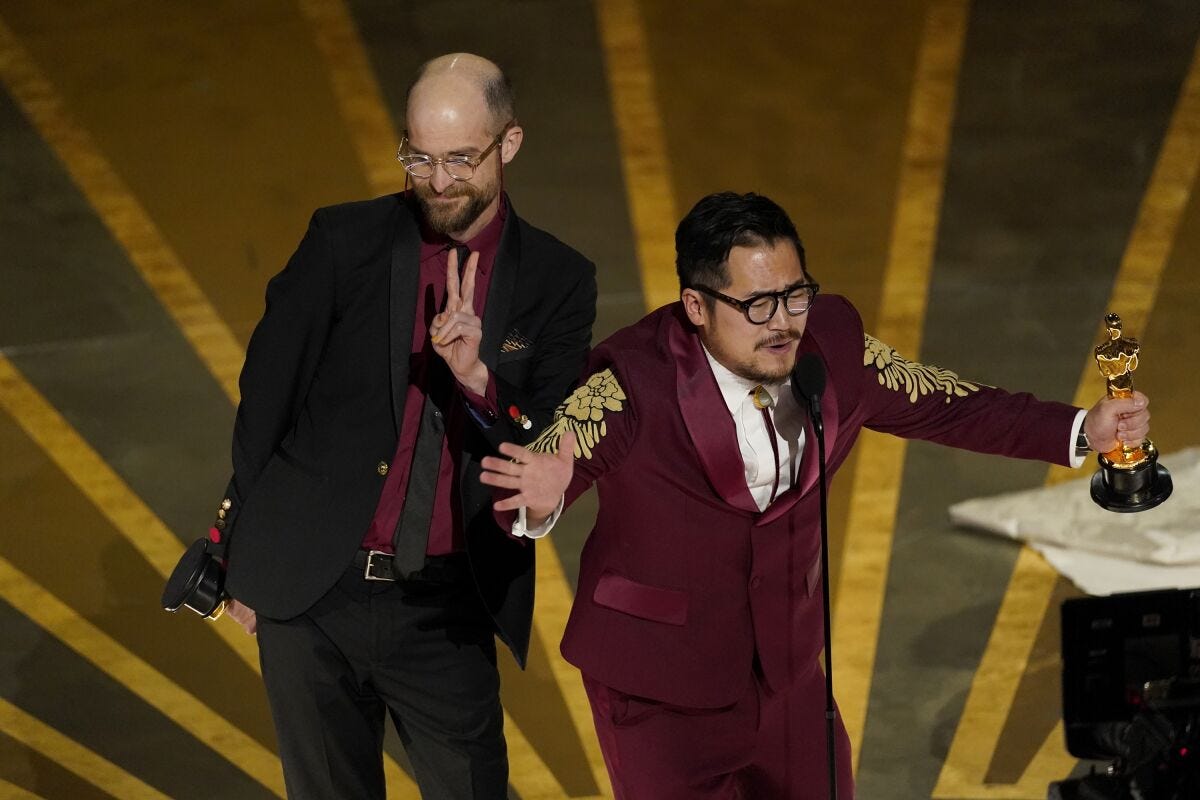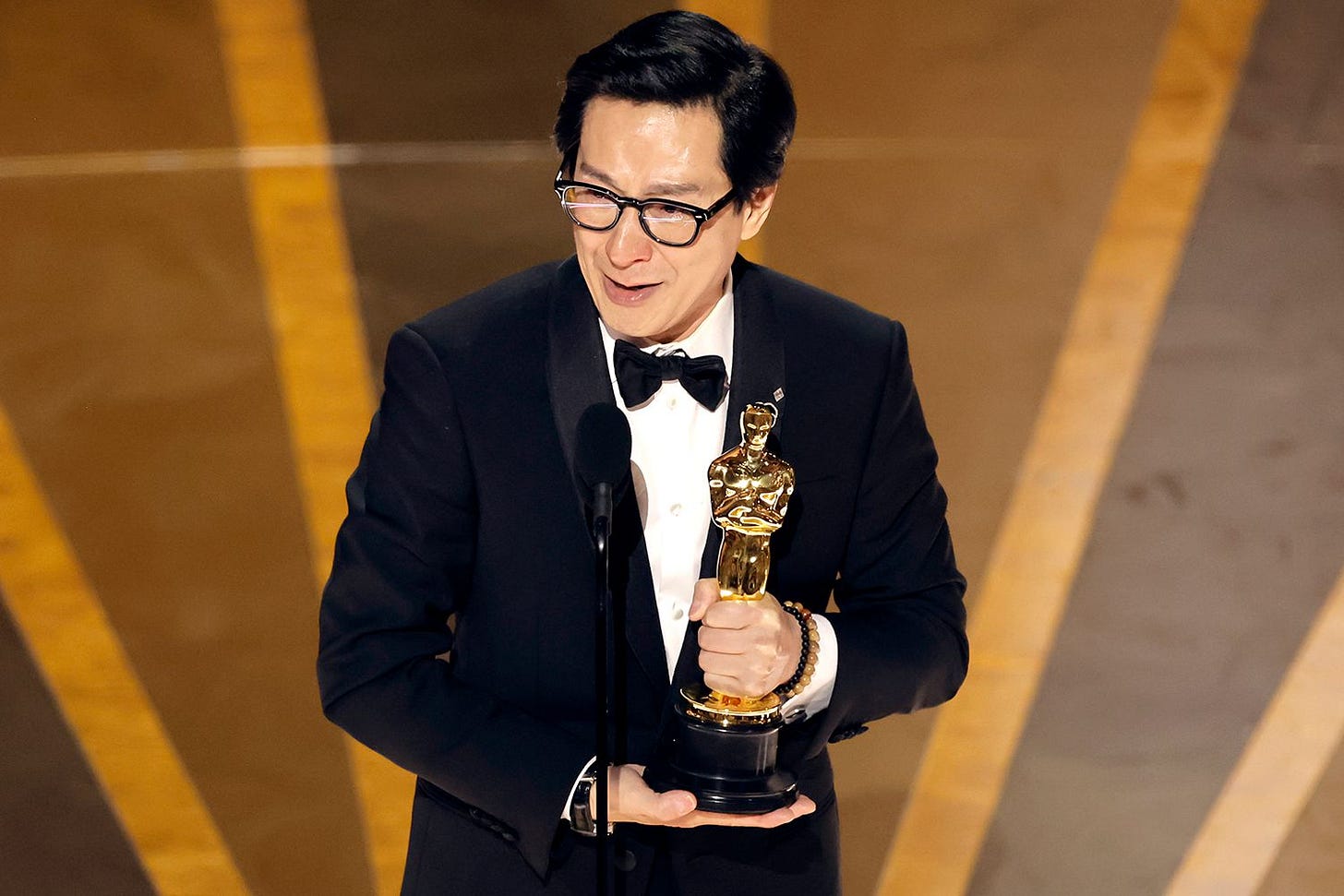The Academy Awards are not about quality. Getting an Oscar does not mean that your film, your performance, or your CGI whale is the best of the bunch. No, the Oscars are not about quality, but about narratives. And I don’t mean the narrative of the film itself, but the narrative surrounding it. The narrative of Hollywood’s directorial godfather making his most personal film to date. The narrative of Austin Butler training so hard to become Elvis that his voice cannot be un-Elvis’d. The narrative of Tom Cruise saving the entire goddamn moviemaking industry from the brink of collapse. Between all those narratives, the Academy has to ask one question: which one best represents the films of 2022?
This year, the Academy went with a narrative that is tried and true and still undefeated: Dreams really do come true after all! Each of the winners gave heartfelt speeches that proclaimed how your dreams can be realized if you only work and believe hard enough. Daniel Kwan and Daniel Scheinert (aka The Daniels) took home three awards for the sci-fi comedy Everything Everywhere All At Once (Best Original Screenplay, Best Directors, and Best Picture), proving that weirdos and underdogs actually do have a place in this world. Brendan Fraser won Best Actor for his performance in The Whale, fulfilling his comeback story in a beautiful, tear-stained speech. Jamie Lee Curtis won for her supporting turn in Everything Everywhere, confirming a long and excellent career.
But the most uplifting moment of all came in the form of Ke Huy Quan, an actor who, like Curtis, won for his supporting role in Everything Everywhere, and who, like Fraser, fulfilled his actorly comeback story in the form of that golden statuette. But Quan, whose impossibly lovable performance was undoubtedly my favorite of 2022, has a four-decade redemption arc that is more impressive than Fraser’s, and just as long as Curtis’. Having begun his career as a child actor in 80s films Indiana Jones and the Temple of Doom and The Goonies, Quan struggled to find work as he came of age in a racist industry that largely provided Asian actors with only demeaning roles. His acceptance speech at this ceremony gave hope not just that Hollywood was changing, but that the American dream was itself alive and well: “They say stories like this only happen in the movies. I cannot believe it’s happening to me. This – THIS – is the American dream.”
When we talk about great narratives at the Oscars, this is it. A meteoric rise by a previously underappreciated child actor who has nothing but positive things to say about his cast and crew? Come on, man. It doesn’t get any better than that.
The big winner of the night was, of course, Everything Everywhere All At Once, which took home seven awards out of a possible eleven nominations. Each win sounded the bell of success for mid-budget independent projects with bursting hearts, and seems to confirm that traditional “Oscar bait” movies are no longer shoo-ins for the category. Put another way, this was a year in which a period-piece biopic (Elvis), a personal reflection about the art of moviemaking (The Fabelmans), an auteur comedy-drama (The Banshees of Inisherin), and a harrowing World War I epic (All Quiet on the Western Front) all lost to a movie about an immigrant laundromat owner who reconnects with her family by learning Kung Fu. That’s an absolutely ridiculous sentence that is also, amazingly, a true one.
Maybe that’s because in 2022, a year in which we returned to real life from our COVID quarantine zones, we needed a movie as insane as this one. We’ve spent most of the last two years online, an experience that Everything Everywhere simulates in a manner that is exhausting, exhilirating, and life-affirming—All At Once. When all of us feel and experience the crazed ludicrousness of life at this rapid pace, maybe we need a movie that doesn’t condemn that experience, but celebrates it. This might just be the narrative that we all need.
A Few Additional Thoughts
I didn’t talk at all about Jimmy Kimmel’s hosting abilities, but in short: he was good! His provocations were minimal; his jokes were for the most part broad and unproblematic. Certainly an improvement from Chris Rock and The Slap, though perhaps also less exciting. Kimmel’s hosting is a bit like Joe Biden’s presidency: generally productive, a bit boring, but nowhere near as tumultuous as his predecessor.
One of the (several) controversies at this year’s awards was the (unfortunately typical) exclusion of women of color, especially black women, from the nominations, particularly egregious this year since Till and The Woman King were frontrunners for such a long time. Director Gina Prince-Bythewood should have been nominated at the replacement of Ruben Östlund (Triangle of Sadness is still Not Good), while Danielle Deadwyler and Viola Davis should have been nominated for Best Actress at the replacement of Michelle Williams and Andrea Riseborough (apologies to the five people who actually saw To Leslie).
Sarah Polley won for Best Adapted Screenplay for Women Talking—an entirely deserved award, but yet another case of a woman being snubbed for Best Director. Speaking of which, one of Kimmel’s better jokes was also one of his most socially conscious: “I mean, how does the Academy not nominate [James Cameron], the guy who directed Avatar? What do they think he is, a woman?”
All Quiet on the Western Front, Edward Berger’s adaptation of the 1929 anti-war novel, deservedly took home four awards for Best International Feature, Best Cinematography, Best Original Score, and Best Production Design. It was an unexpectedly good night for a truly harrowing film, one that powerfully captures the horrors of war at a vital time, as Russia continues its rampaging invasion across Ukraine.
Each time the Daniels got up onstage to accept their awards, their speeches grew more and more tender as they thanked the work of their parents, public school teachers, and to the genius of their cast and crew. It’s sentimental and sappy and all the rest of it, but when Daniel Kwan says that “There is greatness in every single person” and thanks his cast and crew for having “unlocked my genius,” I can’t help but get dewey-eyed. This is the kind of message that the Oscars needs.





Whats the point in judging art by the hype that surrounds it? By hype I mean what you call the narrative that surrounds the film. It seems that there is little consideration for the actual craft that has been put into the film other than for the more technical prizes such as sound and SFX.
Do you agree with me if I say that the Oscars doesn't care for 'art for art's sake'?
Thanks for watching so I didn’t have to 🙏🏼